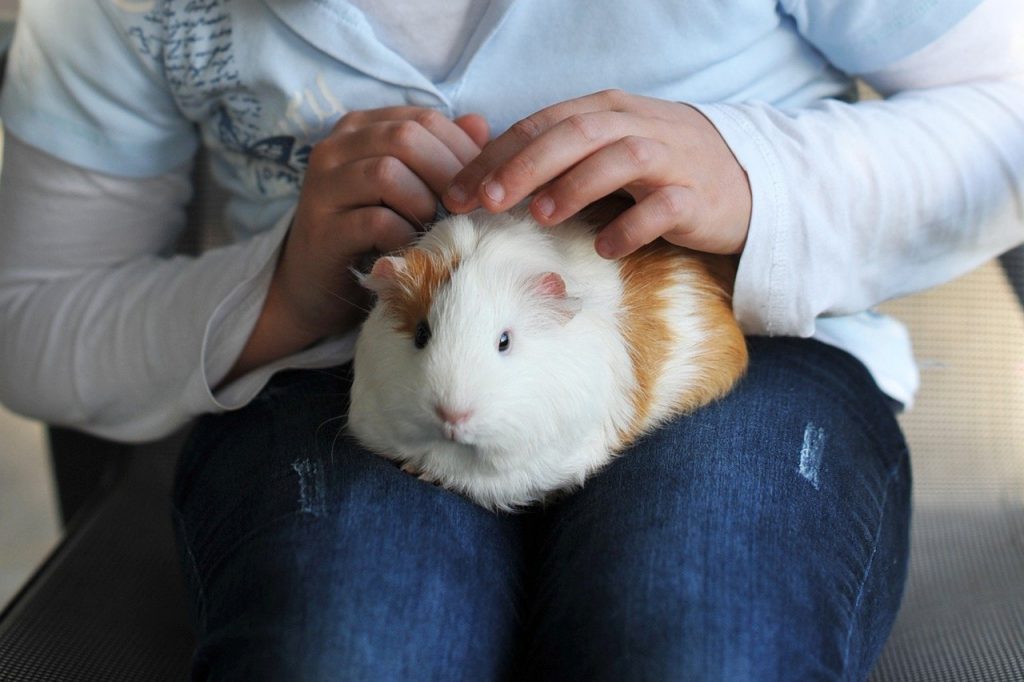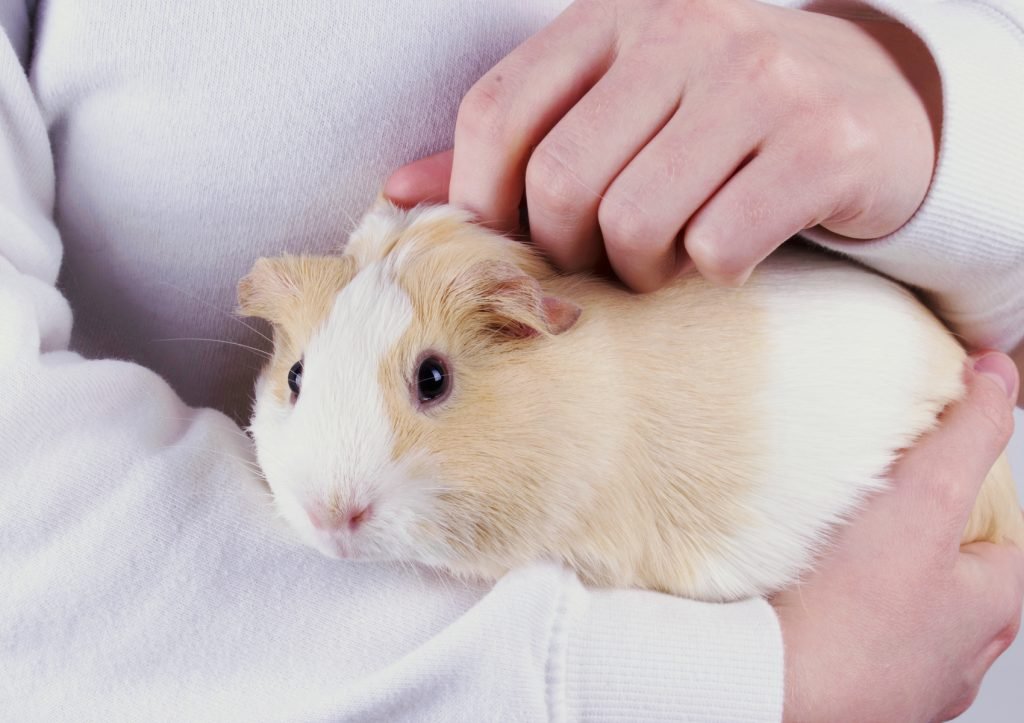Guinea pigs aren’t like dogs or cats where you can easily tell if they like certain interactions. It is normal for owners to wonder do guinea pigs like to be held
This article will explore the reasons why some guinea pigs like to be held and why others do not.
Do Guinea Pigs Like to be Held?
In general guinea pigs are social animals, and if they feel at ease with you, they will typically enjoy being held and petted if done properly. The answer depends on the personality and preference of your particular guinea pig.
Why do Guinea Pigs like to be Held?
Guinea Pigs are social animals and generally enjoy interaction with other guinea pigs and humans once trust has been established. Guinea Pigs seem to enjoy receiving and providing affection and being held by those that they trust.
Why Guinea Pigs Do Not Like to be Held?
Some guinea pigs may not like to be held or carried because being held is not a natural occurrence for them. For guinea pigs who are not used to being held, being held can be a stressful experience.
New Surroundings or New Owner
One reason a guinea pig may not want to be held because they have not become acclimated to their surroundings or to you if there has not been enough time to become comfortable in their environment or build trust with you.
If the surroundings or you are new to the guinea pig, you should give them a period of time to adjust to their new surroundings and to you. During this time, you can occasionally approach their cage and place your hand on or in the cage it and let them approach your hand.
Doing this will help the guinea pig to learn your smell. While doing this you can also offer your guinea pig a treat to help them to develop a positive association with you.
Once the guinea pig feels comfortable approaching your hand, you can also gently stroke your guinea pig’s fur while your hand is in the cage to further build trust with your guinea pig and to help them become comfortable with being touched.
Your Approach was Off
If your guinea pig shows signs of displeasure when you attempt to hold them it may be because you have made them nervous. Sometimes this can be caused by attempting to pick them up when they were asleep or by sneaking up on them and picking them up when they were not looking.
When attempting to pick up your guinea pig to hold them, you should approach them within their field of vision and not when they have their back turned to you.
You Made Your Guinea Pig Nervous
Your guinea pig may also be resistant to being held if you have made them nervous or agitated while making your way to their cage to hold them. Guinea Pigs are sensitive to noise and sudden movement, which can cause them to become nervous.
If the location where your guinea pig resides is noisy or there is a sudden movement in the room while you are attempting to hold them, they may express signs of being unhappy with you holding them.
Injury or Illness
Injury or illness can also be a reason why your guinea pig does not want to be held. These reasons can be especially telling if your guinea pig typically has enjoyed being held in the past, but they are now resistant to being held.
If your guinea pig is injured, the act of you holding them could cause discomfort in the affected area. An illness such as mange could also cause discomfort when you attempt to hold your guinea pig.
Your Scent
Yet another reason why your guinea pig may be resistant to you picking them up or holding them is that you have the scent of another animal on your skin or clothing. If you suspect that this is the case, you might need to wash your hands or wear fresh clothing prior to attempting to hold your guinea pig.
How to Properly Hold a Guinea Pig?
When attempting to hold your guinea pig, you should keep in mind that guinea pigs are prey animals and are naturally nervous. Also be mindful that guinea pigs are delicate animals so be sure to be gentle when holding your guinea pig. Following the below steps should help your cavy feel more comfortable.

Step 1:
If you wish to hold your guinea pig after they have become acclimated to their environment and comfortable with you, you should start by ensuring the room is quiet.
Approach their cage calmly and slowly to avoid making your guinea pig nervous. Make sure that the guinea pig is awake and place your hand on the cage to allow the guinea pig to smell you and become comfortable with your presence.
Once your guinea pig seems calm with your presence, gently open the cage door Gently open the door to the cage.
Step 2:
Once the cage has been opened and you have slowly placed your hand into the cage while gently talking to your guinea pig to avoid startling them. You may be lucky, and the guinea pig will approach your hand.
If this is the case, gently place your hand under your guinea pig’s stomach and gently cup them with one hand on their stomach and the other hand supporting their back and bottom. As you lift the guinea pig from their cage, with your hands supporting their stomach and back/bottom, hold the guinea pig against your chest for additional support.
Step 3:
If your guinea pig doesn’t come to your hand, you should avoid trying to grab them using quick movements and never use force to grab them as this may cause injury. If the guinea pig seems reluctant to come to your hand, you may want to try to lure them to your hand using food or a treat.
**Warning: If this approach does not work, some owners have found that blocking their escape exits in the cage and removing their hiding places makes it easier to get a hold of their guinea pigs. While using these methods may be successful when trying to hold some guinea pigs, it can cause stress in other guinea pigs by making them feel trapped or threatened. If this method seems to make your guinea pig excessively nervous, you may need to wait until the guinea pig’s mood changes or until it feels more comfortable being touched.
Step 4:
Since guinea pigs may become nervous when you hold them, they may attempt to escape from your grasp because they feel threatened. To prevent your guinea pig from falling out of your hands and injuring themselves, you should consider sitting on the floor while holding the guinea pig on your lap.
Step 5:
If your guinea pig begins to squirm or wiggle while you are holding them, this is a natural reaction. When this occurs, you should avoid placing the guinea pig back into their cage at the first sign of wiggling or squirming as they may associate wiggling/squirming as a way to get you to put them back into their cage.
Conclusion
While guinea pigs generally enjoy being held, you should remember that each guinea pig has their own distinct personality and personal preferences. Being carried or held may be appealing to one guinea pig but may cause fear and stress in another guinea pig.
If you plan to hold your guinea pig you should pay attention to the signals that they give when they are happy versus the signals that they give when they are fearful or stressed. If your guinea pig shows signs of being stressed or fearful when being held, you may need to take additional steps to build trust with your guinea pig before attempting to hold them.

